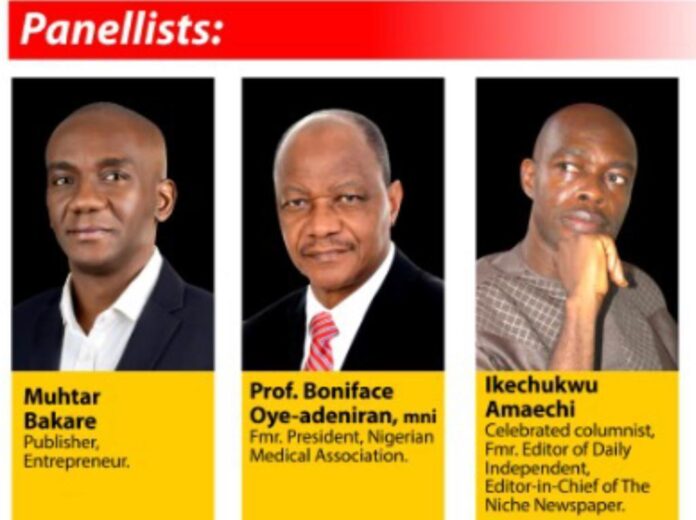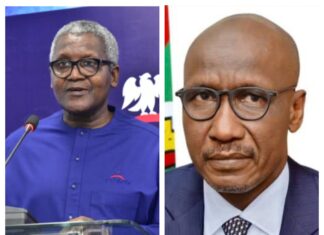Rescue Nigeria Forum identifies corruption as Nigeria’s number one problem, followed by insecurity, then inadequate power, poor healthcare delivery and a deteriorated education sector.
The ways for Nigeria to make progress are; to improve the leadership recruitment process, rebuild the Nigerian family and community systems, and have clarity about the kind of nation we seek to become.
These were some of the submissions of a group of informed Nigerians participating at an event tagged the “People’s Parliament.”
Participants diagnosed the problem with the system and proffered solutions.
Other submissions were that, to stop corruption – which appears to be Nigeria’s number one problem as a nation, it must start from the top; the anti-corruption agencies must be transparently effective, while the ordinary people must be encouraged to report corruption.
READ ALSO
US lays foundation stone of its largest consulate in Lagos
The submissions came from panelists at the People’s Parliament, organised by the Initiative for Good and Informed Citizenship, better known as the Rescue Nigeria movement, on the topic: “What Must Change for Nigeria to Move Forward”.
The Rescue Nigeria panelists were Professor Boniface Oye-Adeniran, former President of the Nigerian Medical Association and a retired professor of obstetrics and gynecology at the College of Medicine, University of Lagos; Muhtar Bakare, an architect, finance expert and publisher; and Ikechukwu Amaechi, an award-winning journalist and newspaper publisher. It was moderated by Anike-ade Funke Treasure, a renowned broadcaster and journalist.
A press statement jointly signed by Biodun Durojaiye and Tunde Odediran of the Rescue Nigeria Movement reported Prof. Oye-Adeniran as identifying corruption as Nigeria’s number one problem, followed by insecurity, then inadequate power, poor healthcare delivery and a deteriorated education sector.
Oye-Adeniran said to tackle corruption, the people must see the results of the anti-corruption war, as he lambasted the Chairman of the Economic and Financial Crimes Commission (EFCC), Mr Abdulrasheed Bawa, for ‘chasing low-hanging fruits’ in the form of Internet fraudsters, with no record of arraigning or convicting even one high profile public servant since he assumed office.
“If we are not going to hold people at the top accountable, we cannot stop corruption,” he said, adding that “we must see the results of the anti-corruption war”.
In his contributions, Muhtar Bakare said Nigerians need to pursue reality and practicality instead of amplifying divine intervention for change, by not always assuming that ‘God will do it’ if ‘We will pray about it’ when we can do something about it. To him, except the people get their act together, nothing in history suggests that a nation that we would all be proud of is achievable, even in a thousand years.
Describing a nation-state as a ‘system’, Bakare said “there are elements of that system to be in place for it to work. If any of the elements is dysfunctional, the whole may not work the way it is supposed to,” adding that the ‘incentives element’ of our own system has been perverted, as the wrong values are being rewarded.
He remarked further: “If we don’t build our nation deliberately and have clearly in our minds the outcomes we seek, we will always end up in this kind of confusion.
“The fundamental problem of the Nigerian state is that there is no consensus amongst the federating units about the kind of nation that we want.”
According to him, what a citizen should expect from the nation, and the obligations of the citizen to the nation must be clear, and people have to buy into it regardless of the part of the country they come from.
“At the centre of the problem of Nigeria is the crisis of the individual – the alienation of the individual from the state … in terms of his or her obligations to the state, and the state’s obligations to him or her”.
Arguing that nation-states are situated in the sociological context of geography and history, he reasoned Nigeria cannot take ideas from Europe and America, operationalise them here and expect them to work perfectly, adding that we must begin to have some trust in some of the ideas that have worked in our communities for centuries before the Europeans came.
Muhtar Bakare further said: “The modern nation-state is built around the individual. The capacity of the individual to assert his right within the community while discharging his obligations to the community.
“The first layer of building communities, of building nationhood has to be the family. We have to make sure the Nigerian family works. Nigeria does not work because the Nigerian family has ceased to work.
“The parents no longer have dignity. They have no control over their children. The nation has broken down at the most fundamental level. We have to go back to fix it. We don’t have communities anymore simply because we don’t have families anymore.
“In architecture, which I studied, when you want to build something, you start from the foundation or substructure. If you build a super-structure without fixing the sub-structure, what you are going to have is a collapse. And that is what we are dealing with.
“We have to make sure that all our policies, every decision we take in this country, there is clarity about the Nigerian family. That wherever they may live, they thrive. That the parents have dignity. That their children look up to them. Then around those families, we build communities, and then we start talking about the nation.
“Parents are struggling. They have no control over their children anymore because they cannot fend for them. We can’t have a nation if we don’t fix that problem.”
Contributing further, Prof. Oye-Adeniran said: “Another problem in Nigeria is that everybody is afraid of the consequences of standing up for what they believe in. Nobody wants to have a visitor in the middle of the night and get eliminated. That is one of our greatest problems.
“Nigerians are known to follow their leaders when they do well. You will remember the queue culture introduced in 1985. And till today, we have been doing that. When the leader introduces a good policy, the people follow. The problem is the sustainability of that policy.
“I think Nigeria as a whole needs to be able to assure its citizenry that mere talking or contributing to national debate will not bring about undesirable consequences. That is what is happening right now. People are being eliminated if they say what the leaders do not want.
“So, the leaders must ensure the security of the citizenry, no matter whether they are for them or against them.
“I am sure you know what is happening in the South East, of people being eliminated simply because they said the wrong thing.”
In his submissions, Ikechukwu Amaechi argued that if we get the leadership recruitment process right, we can begin to turn things around in the country for good.
He said: “I believe Prof Chinua Achebe’s assertion that, “The trouble with Nigeria is simply and squarely a failure of leadership. And it is so because our leadership recruitment process is very faulty. The issue here is leadership and those who operate the system. What values do they bring to the table?
“In the United States presidential system, which we copied, there are checks and balances. But what do we do here? In our own system those with executive powers become absolute monarchs, literally. When someone is elected president or governor, overnight, he becomes a god that must be worshipped. His word becomes law. Instead of the rule of law, we have the rule of strong men. The president is in absolute control of the other arms of government to the extent that a chief justice of the country is removed from office almost by executive fiat and nobody raised a whimper.
“The National Assembly is at the whims and caprices of the President. In ideal situations where there are checks and balances, it should be the other way round. The legislature acts as a check on the excesses of the executive. But here, whatever the President says is what the National Assembly will do. Go to the states, it is even worse. The state Houses of Assembly are mere rubber stamps of the governors who are emperors.
“But it all starts with the leadership recruitment process. The people are mere observers in this so-called democratic dispensation. Look at what happened at the last National Convention of the All Progressives Congress (APC) where over 7,000 delegates converged in Abuja to elect party offices, yet at the end of the day, no single ballot was cast in electing the chairman.
“That is how leaders are recruited here and the other political parties are not better. That is where the problem starts from.”
The second part of the discussion is scheduled for May 29, 2022.















